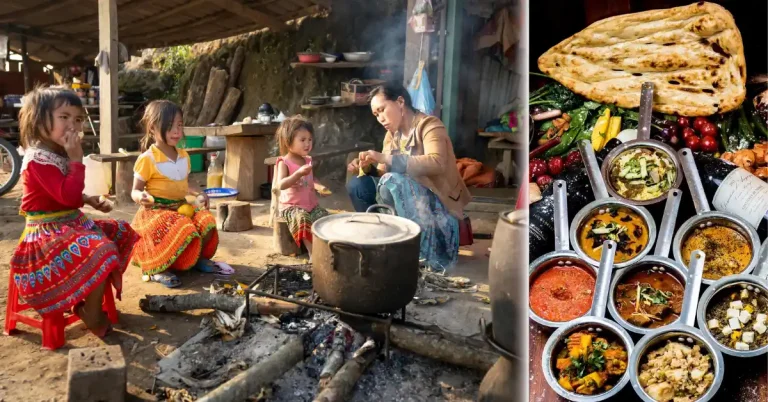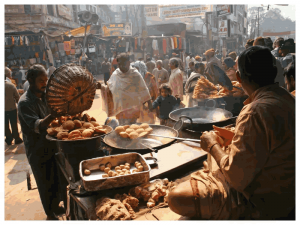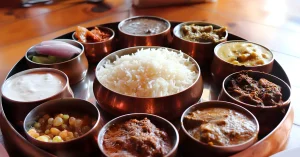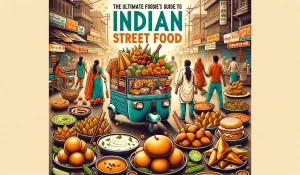Travel is not only about visiting new places but also about tasting new food. When you visit Rajasthan, the land of kings, palaces, and deserts, food becomes a very important part of the journey. Rajasthani cuisine is rich, colourful, and full of history. From spicy curries to sweet treats, every dish has a story. But the best way to really understand the culture of Rajasthan is not by eating in restaurants, but by cooking with locals in their family kitchen.
In this blog, we will see what it feels like to join a Rajasthani family in their kitchen, the recipes you may learn, and why this experience is so special for travellers.
Why Cooking with Locals in Rajasthan Is a Must-Try Experience
When you sit with a family in their home, you see more than just the recipe. You will enjoy the tradition and culture behind each dish. Rajasthani cooking is based on the desert climate and the old heritage of the state. The families share these recipes from one generation to another. Cooking is a kind of social activity.
Cooking with locals allows you to:
- Learn old recipes that are not always found in restaurants.
- Use old-style spices and techniques.
- Share stories and bond with the family.
- Enjoy a meal made with warmth and hospitality.
This experience will turn into a memory. Long after you return home, you will remember the flavours and the laughter you shared in that kitchen.
A Typical Rajasthani Family Kitchen
The kitchen in a Rajasthani home is often simple but full of charm. Many houses still use clay or steel utensils, and food is often cooked on a gas stove or traditional chulha (clay stove). Spices like cumin, coriander, red chilli, and turmeric are kept in small round boxes called masala dabbas. You will also find jars filled with homemade pickles and papads, which are served with almost every meal.
In a family kitchen, cooking is not done in a hurry. It is done with love and care. Children sit around watching TV or helping the other members. One can enjoy the smell of fresh rotis or ghee that fills the room. For the travellers, apart from seeing the famous forts and palaces in Rajasthan, cooking with the locals is a warm and welcoming experience.
Cooking with Locals: Famous Rajasthani Recipes You May Learn
List are some of the famous dishes you can expect to cook and taste when joining a local family:
1. Dal Baati Churma
This is one of the famous Rajasthani dishes. Baatis are round wheat balls. They are baked till crisp and served with spicy dal (lentils). Also, the sweet churma (crushed wheat with ghee and sugar) is included as a part dish.
To make baati, roll the dough into small balls and cook them in an oven or on a coal. The families often enjoy this as a festive meal.
2. Gatte ki Sabzi
Since Rajasthan is a desert, fresh vegetables were not always available in old times. Thus, many dishes are made with gram flour (besan). To make Gatte ki sabzi, first of all, prepare a curry with gram flour dumplings cooked in yoghurt gravy.
Learning this recipe shows you how people created delicious food even with limited ingredients.
3. Ker Sangri
Rajasthan is desert. Ker (a wild berry) and sangri (a desert bean) are dried and then cooked with spices. The dish has a tangy and local taste. Many families store ker sangri for months. It is the best survival food for desert life.
4. Laal Maas
If you are a non-vegetarian, then laal maas is really a tasty item. A fiery red mutton curry is prepared with Mathania red chillies. This gives the dish a bold flavour. In family kitchens, the spice level may be adjusted depending on your taste.
5. Rajasthani Sweets
No meal is complete without sweets. You may get to make ghevar (a disc-shaped sweet soaked in sugar syrup), malpua (sweet pancakes), or mohanthal (a type of gram flour fudge). Rajasthani families are very proud of their mithai, and they love to serve it to guests. A lot of visitors come to this lovely state, during the best time to visit Rajasthan and try tasty sweets.
Cooking with Locals: The Learning Experience
Cooking with Rajasthani locals is not like attending a professional cooking class. It’s much more personal and relaxed. The grandmother might show you how to knead the dough, while the children make you feel comfortable. You may be asked to roll rotis or stir the curry. Sometimes, mistakes happen, but the family will cheer you on and make you feel at home.
Along with recipes, you also learn about Rajasthani customs. For example, many families sit on the floor to enjoy the food. Also, the food is often served in thalis, metal plates. Thus, all these will give you chances to enjoy the food.
Beyond Food: Sharing Stories
When you cook with locals, conversations naturally flow. Families may tell you about their festivals like Diwali or Teej festival, their wedding traditions, or even their daily life in the desert. You may learn about how women in Rajasthan wear colourful ghagras and men wear turbans. These small stories add depth to your travel experience.
Many travellers say that this cultural exchange is more memorable than visiting a monument. After all, palaces show you history, but kitchens show you the present life of Rajasthan.
Why is this Experience Special for Travellers?
Rajasthan has many places, forts, palaces and deserts. But cooking with locals gives you a new experience. It gives you a chance to connect with the locals. You don’t just see Rajasthan, you live it. The taste of dal baati cooked by a mother in her small kitchen stays longer in memory than a fancy restaurant meal.
This experience also teaches you to respect food. You see how every spice, every grain and every drop of ghee has a purpose. And when you eat together, you don’t just fill your stomach—you also fill your heart.
Where to Find These Experiences in Rajasthan
While Jaipur, Jodhpur, and Udaipur are the popular cooking class cities, you may have just as good of a cultural experience and an even more authentic interaction in towns like Bundi or Pushkar instead. Many hosts post their experiences on Airbnb Experiences, or you can book local tour operators.
Why You’ll Remember This Forever
Cooking with locals is about more than just food—it’s about connection. You will leave with recipes, but also with a little piece of Rajasthan, wrapped up in stories, flavors, and the warmth of its people. Every time you cook Dal Baati Churma when you’re back home in another country, you’ll reflect on those moments.
So next time you are in Rajasthan, forgo yet another meal in a restaurant and get into a family kitchen. You’ll find that the best souvenirs are not bought, they are cooked, shared, and remembered.
Tips for Cooking with Locals
Be Open-Minded- Not everything will taste like you. So try something you like. Be open to learn the Rajasthani food.
Respect Traditions- Some families may have a custom of removing shoes before entering the kitchen. So respect them.
Learn Actively- You can always ask questions about the ingredients used in the dish. Every dish has a different style of cooking.
Offer Help- Families love when you join in rather than just watch.
Share Your Culture- Tell them about food from your country too.
Conclusion
Cooking with locals in Rajasthan is more than just a cooking lesson. It is a way to stay connected with Rajasthan culture. One can learn recipes that are centuries old and enjoy flavours shaped by the desert. Also, one can connect with people who open their homes and hearts for you.
So next time when you come on a Rajasthan trip, do not miss this opportunity. Visit a family kitchen, roll some baatis, stir a curry, and enjoy the Rajasthani hospitality. It will be the highlight of your trip.
FAQs
One can learn many famous dishes such as dal baati churma, gatte ki sabzi, ker sangri, laal maas, etc. Also, try old-style sweets such as ghevar or malpua.
No, you do not. Families are very welcoming and happy to guide beginners. You can simply help with small tasks like rolling rotis or stirring the food.
In restaurants, you only taste the food. In family kitchens, you learn recipes, hear stories, and share laughter. It gives you a deeper cultural experience.







You must be logged in to post a comment.